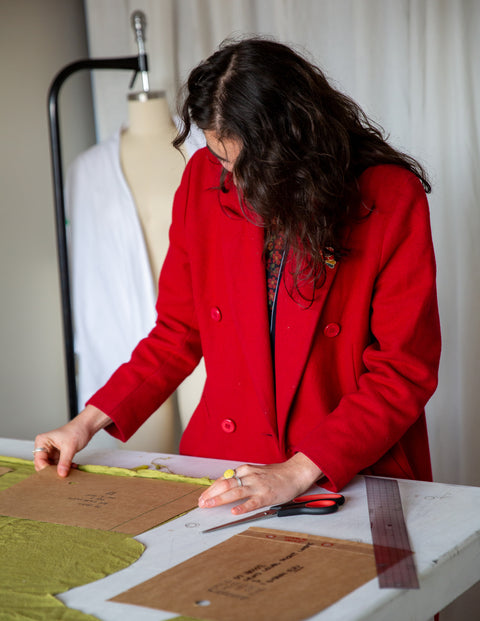
Hospo's Elephant In The Room
What is our attitude toward clothing that will be stained, torn, and ultimately worn out?
Every year Australians dispose of an average of 23 kilos of clothing in landfills. On the other hand, the hospitality industry is known to churn through a carousel of black tops and slacks.
After reflecting on Day Seven’s business model, being a contemporary solution for the hospitality industry, we acknowledged we’re adding to a more significant problem: fashion and textile waste.
Passionate advocates against fast-fashion practices in their lives, Day Seven founder Molly and Production Manager Hannah knew it was time to ask the question in the context of uniforms. That question is,
“Where do uniforms end up once you have finished wearing them?”
At worst and regrettably most often, clothing and textiles are headed for landfills. In the ideal case, clothing can be donated as rags, repurposed by upcycling, or recycled through fibre shredding (for products such as upholstery padding).

We know hospitality has a notoriously high turnover. Relying on staff to provide black clothing that will be worn past repair doesn't reflect the business's care and pride in its curated brand and style.
Business owners could further their efforts in sustainability practices, from their produce sourcing and composting to their takeaway coffee cups. And now, it's on to the uniforms they supply their staff.
For an industry that runs 24/7, the work of setting up an initiative like the above is not always achievable. It is also not highly prioritised in a long list of operation procedures.
To ease this burden, Day Zero was born.

The ultimate goal for Day Zero is to de-saturate the current hospitality uniforms market with synthetic fibres that are low quality and bulk bought, giving them an overall shorter wear cycle.
By offering an upcycling initiative like Day Zero, we take responsibility for where your old uniforms end up. This can change how we think about acquiring new workwear altogether.
By taking responsibility for what we produce and the textiles we use, we begin to do our part for the ocean's microplastic pollution. This is caused by washing synthetic fabrics such as polyester, which accounts for over eighty per cent of all shoreline pollution worldwide.
Our process starts with assessing the condition of worn pieces and what they could be best used for. Occasionally, when we find unique fabrics in old uniforms, we invite emerging designers to create experimental yet functional pieces for the uniforms scene.
Day Seven & Day Zero aim only to produce what is needed and at the highest quality. We nurture long-term relationships with our clients because we see ourselves as responsible for the longevity and durability of our workwear.
Our repair services, ongoing tailoring services, and educational content enable this.
It’s time to change and challenge businesses' mindsets and relationships with their workwear. Such as money (too expensive) and staff (they don't look after them).

We hope to spark conversation about why and how this is the case and its necessity in the current climate.
Due to the above, we understand that our customers may not be equipped with our expertise. Therefore, we intend to educate them on the circularity, care and respect required to sustain a lifelong workwear piece.
You can participate with Day Zero without being a Day Seven customer. If you have old uniforms you are unsure what to do with, get in touch, and we can organise a consultation and collection.
We are always keen to collaborate with other like-minded people and businesses. We're currently working on feeding our fabric scraps to Funghi to produce ethical packaging, and we hope to become ethically accredited at the beginning of 2023.
Get in touch to hear more about Day Zero's sustainability practices or Day Seven's custom design service.

